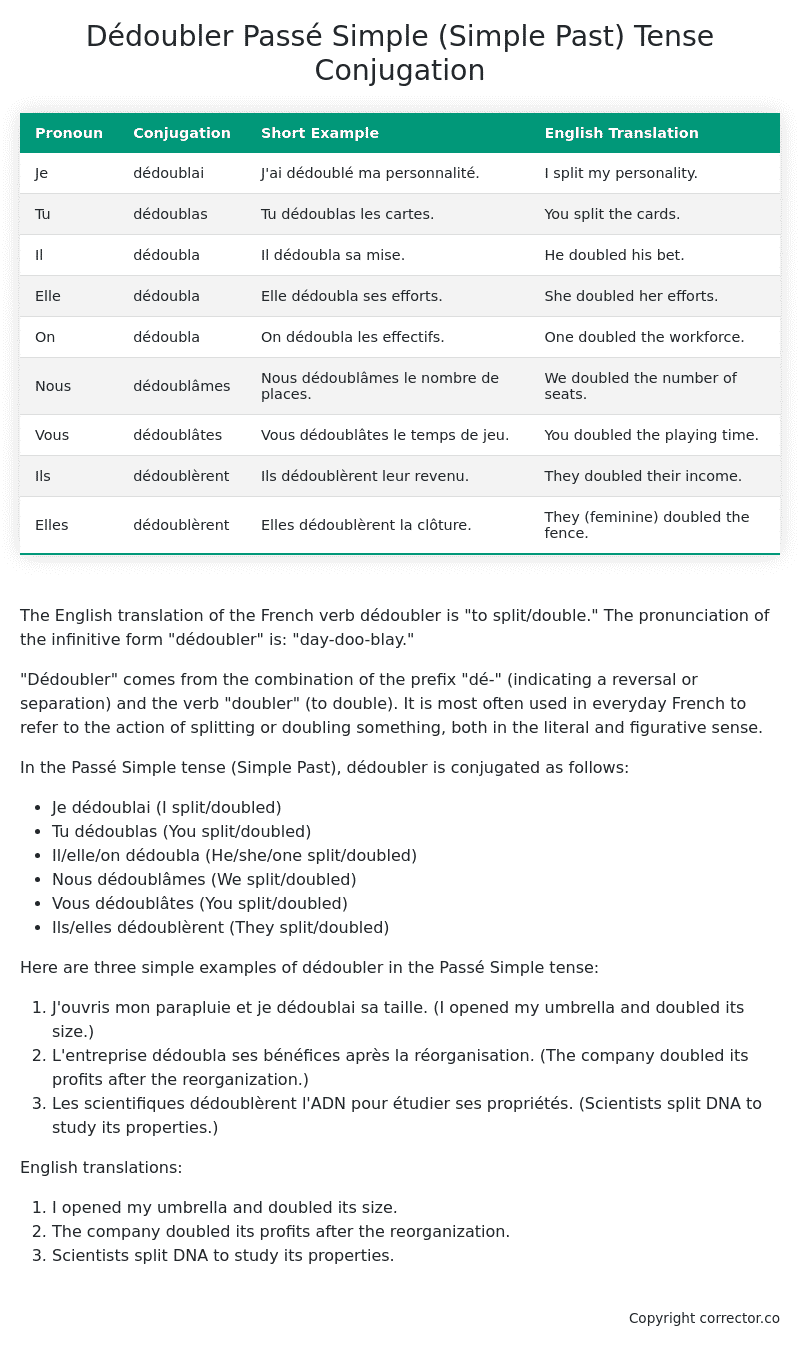Passé Simple (Simple Past) Tense Conjugation of the French Verb dédoubler
Introduction to the verb dédoubler
The English translation of the French verb dédoubler is “to split/double.” The pronunciation of the infinitive form “dédoubler” is: “day-doo-blay.”
“Dédoubler” comes from the combination of the prefix “dé-” (indicating a reversal or separation) and the verb “doubler” (to double). It is most often used in everyday French to refer to the action of splitting or doubling something, both in the literal and figurative sense.
In the Passé Simple tense (Simple Past), dédoubler is conjugated as follows:
- Je dédoublai (I split/doubled)
- Tu dédoublas (You split/doubled)
- Il/elle/on dédoubla (He/she/one split/doubled)
- Nous dédoublâmes (We split/doubled)
- Vous dédoublâtes (You split/doubled)
- Ils/elles dédoublèrent (They split/doubled)
Here are three simple examples of dédoubler in the Passé Simple tense:
- J’ouvris mon parapluie et je dédoublai sa taille.
(I opened my umbrella and doubled its size.) - L’entreprise dédoubla ses bénéfices après la réorganisation.
(The company doubled its profits after the reorganization.) - Les scientifiques dédoublèrent l’ADN pour étudier ses propriétés.
(Scientists split DNA to study its properties.)
English translations:
- I opened my umbrella and doubled its size.
- The company doubled its profits after the reorganization.
- Scientists split DNA to study its properties.
Table of the Passé Simple (Simple Past) Tense Conjugation of dédoubler
| Pronoun | Conjugation | Short Example | English Translation |
|---|---|---|---|
| Je | dédoublai | J’ai dédoublé ma personnalité. | I split my personality. |
| Tu | dédoublas | Tu dédoublas les cartes. | You split the cards. |
| Il | dédoubla | Il dédoubla sa mise. | He doubled his bet. |
| Elle | dédoubla | Elle dédoubla ses efforts. | She doubled her efforts. |
| On | dédoubla | On dédoubla les effectifs. | One doubled the workforce. |
| Nous | dédoublâmes | Nous dédoublâmes le nombre de places. | We doubled the number of seats. |
| Vous | dédoublâtes | Vous dédoublâtes le temps de jeu. | You doubled the playing time. |
| Ils | dédoublèrent | Ils dédoublèrent leur revenu. | They doubled their income. |
| Elles | dédoublèrent | Elles dédoublèrent la clôture. | They (feminine) doubled the fence. |
Other Conjugations for Dédoubler.
Le Present (Present Tense) Conjugation of the French Verb dédoubler
Imparfait (Imperfect) Tense Conjugation of the French Verb dédoubler
Passé Simple (Simple Past) Tense Conjugation of the French Verb dédoubler (You’re reading it right now!)
Passé Composé (Present Perfect) Tense Conjugation of the French Verb dédoubler
Futur Simple (Simple Future) Tense Conjugation of the French Verb dédoubler
Futur Proche (Near Future) Tense Conjugation of the French Verb dédoubler
Plus-que-parfait (Pluperfect) Tense Conjugation of the French Verb dédoubler
Passé Antérieur (Past Anterior) Tense Conjugation of the French Verb dédoubler
Futur Antérieur (Future Anterior) Tense Conjugation of the French Verb dédoubler
Subjonctif Présent (Subjunctive Present) Tense Conjugation of the French Verb dédoubler
Subjonctif Passé (Subjunctive Past) Tense Conjugation of the French Verb dédoubler
Subjonctif Imparfait (Subjunctive Imperfect) Tense Conjugation of the French Verb dédoubler
Subjonctif Plus-que-parfait (Subjunctive Pluperfect) Tense Conjugation of the French Verb dédoubler
Conditionnel Présent (Conditional Present) Tense Conjugation of the French Verb dédoubler
Conditionnel Passé (Conditional Past) Tense Conjugation of the French Verb dédoubler
Conditionnel Passé II (Conditional Past II) Tense Conjugation of the French Verb dédoubler
L’impératif Présent (Imperative Present) Tense Conjugation of the French Verb dédoubler
L’impératif Passé (Imperative Past) Tense Conjugation of the French Verb dédoubler
L’infinitif Présent (Infinitive Present) Tense Conjugation of the French Verb dédoubler
L’infinitif Passé (Infinitive Past) Tense Conjugation of the French Verb dédoubler
Le Participe Présent (Present Participle) Tense Conjugation of the French Verb dédoubler
Le Participe Passé (Past Participle) Tense Conjugation of the French Verb dédoubler
Struggling with French verbs or the language in general? Why not use our free French Grammar Checker – no registration required!
Get a FREE Download Study Sheet of this Conjugation 🔥
Simply right click the image below, click “save image” and get your free reference for the dédoubler Passé Simple tense conjugation!

Dédoubler – About the French Passé Simple (Simple Past) Tense
Formation
Usage
Narration
Historical Context
Interactions with other tenses
Passé Composé
Imparfait
Conditional and Subjunctive
Summary
I hope you enjoyed this article on the verb dédoubler. Still in a learning mood? Check out another TOTALLY random French verb conjugation!


